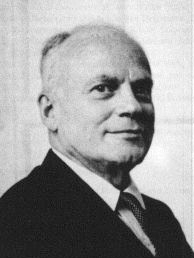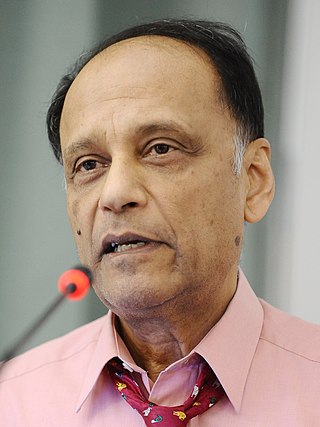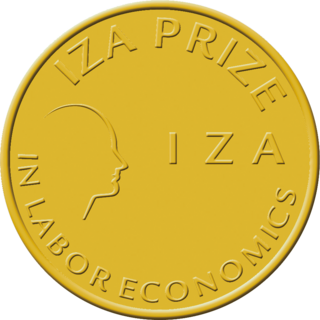
Paul Demeny (born Nyiregyhaza, Hungary in 1932) is a Hungarian demographer and economist known for pioneering the concept of Demeny voting. [1]

Paul Demeny (born Nyiregyhaza, Hungary in 1932) is a Hungarian demographer and economist known for pioneering the concept of Demeny voting. [1]
Demeny graduated from the Reformed College of Debrecen in 1951 and from the University of Budapest in 1955. He then attended the Graduate Institute of International Studies in Geneva in 1957. He eventually received a PhD in economics from Princeton University in 1961. At Princeton, his mentors were demographers Frank W. Notestein and Ansley J. Coale, as well as economists William Baumol, Oscar Morgenstern and Jacob Viner. [2] [3]
He was appointed assistant professor of economics at Princeton University in 1961, and as research associate at Princeton's Office of Population Research, a research center. In 1966, he moved to the University of Michigan and in 1969 to the University of Hawaii. In 1973, he joined the Population Council, a U.S.-based non-profit, as vice president and director of its Demographic Division. There, he founded the Population and Development Review, a quarterly peer-reviewed academic journal. [4]
Demeny is known for introducing the idea of Demeny voting in 1986. [5] Demeny voting is a system that would "let custodial parents exercise the children's voting rights," with the goal of "mak(ing) the political system more responsive to the young generation's interests" and addressing the threat of gerontocracy. [6] [7]
In 2003, he was named laureate of the International Union for the Scientific Study of Population. [8] In 2018, he was awarded the Hungarian Order of St. Stephen. [9]

Jacob Viner was a Canadian economist and is considered with Frank Knight and Henry Simons to be one of the "inspiring" mentors of the early Chicago school of economics in the 1930s: he was one of the leading figures of the Chicago faculty. Paul Samuelson named Viner as one of the several "American saints in economics" born after 1860. He was an important figure in the field of political economy.

Sir Partha Sarathi Dasgupta is an Indian-British economist who is Frank Ramsey Professor Emeritus of Economics at the University of Cambridge, United Kingdom, and a fellow of St John's College, Cambridge.
Ansley Johnson Coale, was one of America's foremost demographers. A native to Baltimore, Maryland, he earned his Bachelor of Arts in 1939, his Master of Arts in 1941, and his Ph.D. in 1947, all at Princeton University. A long-term director of the Office of Population Research at Princeton, Coale was especially influential for his work on the demographic transition and for his leadership of the European Fertility Project.

Eric Stark Maskin is an American economist and mathematician. He was jointly awarded the 2007 Nobel Memorial Prize in Economic Sciences with Leonid Hurwicz and Roger Myerson "for having laid the foundations of mechanism design theory". He is the Adams University Professor and Professor of Economics and Mathematics at Harvard University.
Chidambara Chandrasekaran (1911–2000) was noted Indian demographer and statistician, was educated in India, UK and the US. He graduated from Morris College, Nagpur, with a B.Sc. degree, followed by a M.Sc. degree from the Nagpur University, and a PhD degree in Statistics from University College London in 1938. He was also awarded an MPH degree from Johns Hopkins School of Hygiene and Public Health in 1947.
Note that in some publications his name is spelled as "Chandra Sekar".
He was related to two Nobel Prize winners: C. V. Raman was his uncle and Subrahmanyan Chandrasekhar was his cousin.

Ronald Freedman (1917–2007) was an international demographer and founder of the Population Studies Center at the University of Michigan. He led pioneering survey research on fertility in Asia. Born in Winnipeg, Canada, Freedman grew up in Waukegan, Illinois. He received a BA in history and economics from the University of Michigan in 1939, and a master's degree in sociology in 1940. At the University of Chicago he completed prelims for his PhD in sociology before joining the U.S. Army in 1942 to serve in the Air Corps Weather Service.

The Institute for the Study of Labor awards a prize each year for outstanding academic achievement in the field of labor economics. The IZA Prize in Labor Economics has become a highly prestigious science award in international economics, is the only international science prize awarded exclusively to labor economists and is considered the most important award in labor economics worldwide. The prize was established in 2002 and is awarded annually through a nomination process and decided upon by the IZA Prize Committee, which consists of internationally renowned labor economists. As a part of the prize, all IZA Prize Laureates contribute a volume as an overview of their most significant findings to the IZA Prize in Labor Economics Series published by Oxford University Press.

Abhijit Vinayak Banerjee is an Indian-born naturalized American economist who is currently the Ford Foundation International Professor of Economics at Massachusetts Institute of Technology. Banerjee shared the 2019 Nobel Memorial Prize in Economic Sciences with Esther Duflo and Michael Kremer "for their experimental approach to alleviating global poverty". He and Esther Duflo, who are married, are the sixth married couple to jointly win a Nobel Prize.
Demeny voting is a type of proxy voting where the provision of a political voice for children by allowing parents or guardians to vote on their behalf. The term is named after demographer Paul Demeny even though the concept predates him and is often pitched as a stop-gap measure for whatever ages suffrage is denied to youth. Under a Demeny voting system, parents would decide how to cast each child's proxy vote, and some systems could allow for a split vote if the parents' political views differ. Children would gain the right to vote either at a certain voting age or when they feel they are ready.

Wolfgang Lutz is an Austrian demographer specializing in demographic analysis and population projection. He founded the Wittgenstein Centre for Demography and Global Human Capital in 2010 – a collaboration between IIASA, the Vienna Institute of Demography (VID) of the Austrian Academy of Sciences, and the WU-Vienna University of Economics and Business. In October 1985 he joined IIASA to lead the World Population Program. He has been director of VID since 2002 as well as a full professor of applied statistics (part-time) at Vienna University since 2008. He also holds the position of professorial research fellow at the Oxford Martin School for 21st Century Studies.
Anatole Romaniuk was a Ukrainian Canadian demographer who made contributions to the subject areas of fertility and sterility, African demography, Aboriginal studies, the understanding of demographic processes and population forecasting. He played a key role in numerous population censuses, including the first population census in the Democratic Republic of Congo, several censuses in Canada from 1970 through to 1993, and the first census of independent Ukraine (2001).

Arturo C. Porzecanski is a Uruguayan-born economist who has spent his entire adult life in the United States.
John P. M. Bongaarts is a Dutch-American demographer. He serves as Vice-President and Distinguished Scholar at the Population Council, where he has worked since the 1970s. Bongaart has performed research in a diverse set of topics, such as population growth and aging, mortality, population-environment links and demography related to the epidemiology of HIV/AIDS. His most recognized work lies in the field of fertility, and has been a topic of interest throughout his career.
William Brass was a Scottish demographer. He developed indirect methods for estimating mortality and fertility in populations with inaccurate or incomplete data, often dubbed "Brass methods" after him.
Robert A. Pollak is an economist. Pollak has made contributions to the specification and estimation of consumer demand systems, social choice theory, the theory of the cost of living index, and since the early 1980s, to the economics of the family and to demography. He is currently the Hernreich Distinguished Professor of Economics at Washington University in St. Louis, holding joint appointments in the Faculty of Arts & Sciences and in the Olin Business School.
Sidney Goldstein was an American demographer. He was George Hazard Crooker University Professor at Brown University from 1977 to 1993.
Cheikh Seydil Moctar Mbacké is a Senegalese statistician. He is a research fellow in the Center for Research on Applied Economics and Finance at the Université de Thiès in Senegal. He works in international development, with a particular focus on population and health research in Sub-Saharan Africa. Mbacke was elected a Foreign Associate of the National Academy of Sciences (NAS) in 2018.

Mercedes B. Concepcion is a Filipino social scientist who was named a National Scientist of the Philippines in 2010. Concepcion was also dubbed the "Mother of Asian Demography" because of her contributions in population studies and policy within the region. In 2002, she was named the "First Filipino Demographer" by the Philippine American Foundation. A few years later, she won the 2005 United Nations Population Award for her outstanding work in population studies on social and economic development, urbanization, and public health and welfare. Concepcion is currently the Vice President of the Executive Council of the National Academy of Science and Technology (NAST) and is a Trustee for both the Philippine Center for Population and Development (PCPD) and Foundation for Adolescent Development, among several other roles.
Wilfred David "Mick" Borrie was a New Zealand-born Australian demographer and academic.